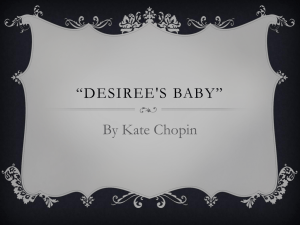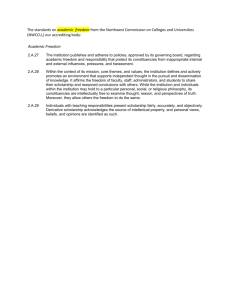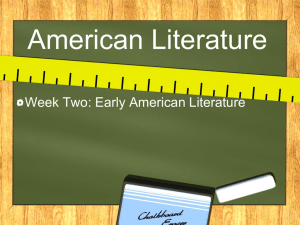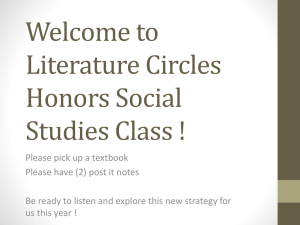Leaders@LIT Student Scholarship Programme Proposal
advertisement
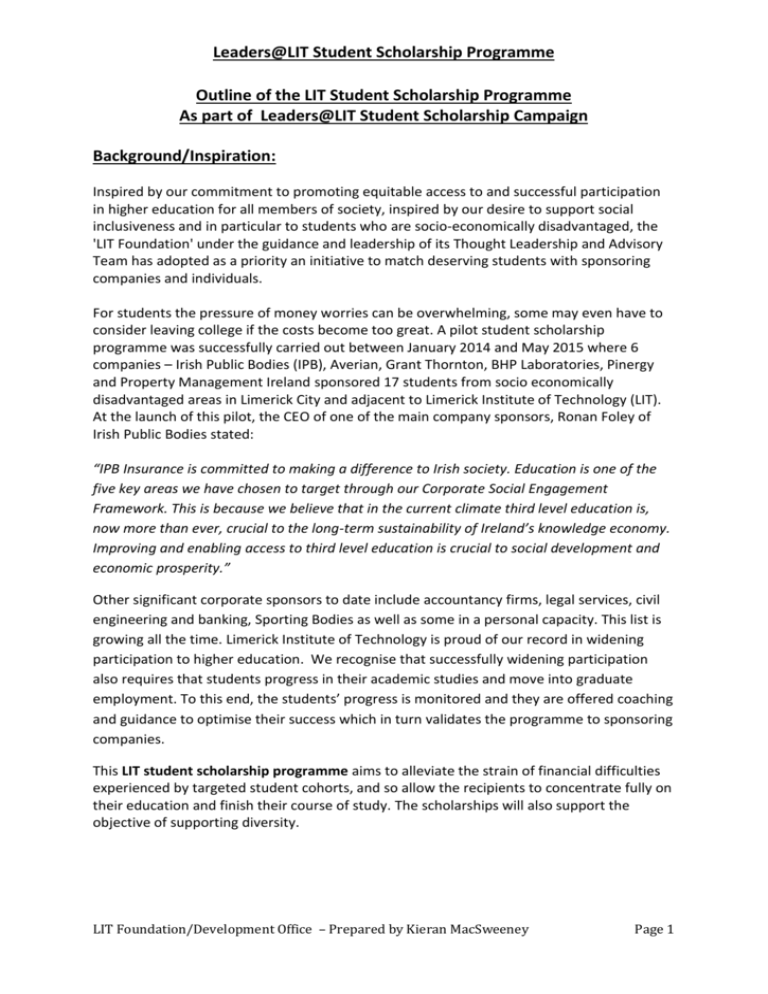
Leaders@LIT Student Scholarship Programme Outline of the LIT Student Scholarship Programme As part of Leaders@LIT Student Scholarship Campaign Background/Inspiration: Inspired by our commitment to promoting equitable access to and successful participation in higher education for all members of society, inspired by our desire to support social inclusiveness and in particular to students who are socio-economically disadvantaged, the 'LIT Foundation' under the guidance and leadership of its Thought Leadership and Advisory Team has adopted as a priority an initiative to match deserving students with sponsoring companies and individuals. For students the pressure of money worries can be overwhelming, some may even have to consider leaving college if the costs become too great. A pilot student scholarship programme was successfully carried out between January 2014 and May 2015 where 6 companies – Irish Public Bodies (IPB), Averian, Grant Thornton, BHP Laboratories, Pinergy and Property Management Ireland sponsored 17 students from socio economically disadvantaged areas in Limerick City and adjacent to Limerick Institute of Technology (LIT). At the launch of this pilot, the CEO of one of the main company sponsors, Ronan Foley of Irish Public Bodies stated: “IPB Insurance is committed to making a difference to Irish society. Education is one of the five key areas we have chosen to target through our Corporate Social Engagement Framework. This is because we believe that in the current climate third level education is, now more than ever, crucial to the long-term sustainability of Ireland’s knowledge economy. Improving and enabling access to third level education is crucial to social development and economic prosperity.” Other significant corporate sponsors to date include accountancy firms, legal services, civil engineering and banking, Sporting Bodies as well as some in a personal capacity. This list is growing all the time. Limerick Institute of Technology is proud of our record in widening participation to higher education. We recognise that successfully widening participation also requires that students progress in their academic studies and move into graduate employment. To this end, the students’ progress is monitored and they are offered coaching and guidance to optimise their success which in turn validates the programme to sponsoring companies. This LIT student scholarship programme aims to alleviate the strain of financial difficulties experienced by targeted student cohorts, and so allow the recipients to concentrate fully on their education and finish their course of study. The scholarships will also support the objective of supporting diversity. LIT Foundation/Development Office – Prepared by Kieran MacSweeney Page 1 Leaders@LIT Student Scholarship Programme Challenges: The current scholarship plan does not support a scalable model. It also does not incorporate a campaign with LIT Alumni and it does not have as part of it a Regular Giving Campaign with Alumni which requires a totally different strategy and implementation plan. And the current plan does not incorporate all the “Areas of Success” adopted for world-class Regular Giving Scholarship campaigns outlined below. Agreed parameters for the campaign: 1. We focus on Access Students who require financial support to complete their studies in LIT. 2. We complete a “report card” on the progress of the initial 17 students who received scholarships and share it with the 6 donor companies and the Thought leadership and Advisory Team. We invite them to continue their participation. 3. We develop campaigns for 2 channels in addition to the Thought Leadership and Advisory Team: a. The corporate channel. Based on the pledges provided by the LIT Thought Leadership team, we focus on highlighting the dependencies business and education have together and leverage the corporate social engagement aspirations of companies. b. We launch a campaign with our Alumni (once data is validated) to incorporate direct mail, phone contact, social media and email. As part of this, we start with a survey focused on their interests, memories and ambitions of LIT. We complete a segmentation of the Alumni based on their responses and allow for smaller contributions. 4. We co-brand the student scholarships with corporate donors where requested with the core brand being Leaders@LIT Student Scholarships. 5. We build in a “leveraging strategy” by launching a plan to “match” the scholarships supported by the Thought Leadership and Advisory Team. Campaigns with matching sponsorship have far higher success rates than those without. The plan is to double the support from the Thought Leadership Team. Target for the Thought Leadership and Advisory Team is a minimum of 15 and possibly 20. 6. We present a customised offering to the student scholarship donors where they can decide (a) course of study being pursued by the student, (b) the geographical location of the student or a specific feeder school to LIT, (c) student available for internship, (d) a branding of the scholarship to include their company name e.g. the XXXXXX Leaders@LIT student scholarship. We give corporate donors priority access to undergraduates in presenting to them. 7. We provide a mentorship and advice service to all student scholarship awardees which is already successfully in place for a number of years. 8. We look at offering a scholarship in a collaboration opportunity with UL and/or MIC? LIT Foundation/Development Office – Prepared by Kieran MacSweeney Page 2 Leaders@LIT Student Scholarship Programme 9. We create a parallel campaign for LIT Alumni to include: a. we complete a survey with Alumni to determine their interests and priorities. b. we create a “Regular Giving Campaign” . c. we also present to LIT staff. d. we build in the flexibility of allocating some of the Fund for supports to 2 nd level students and preparing them for 3rd level. e. The Regular Giving campaign to incorporate the Areas of Success for highperforming Regular Giving campaigns which include the following (ref: UCD Champions – changing futures regular giving campaign) 1) 2) 3) 4) 5) 6) A clearly defined strategy and implementation plan. Clear Regular Giving definition. Branded Regular Giving campaign. Unified case for support. Donor Centric approach and simplified giving choices. Utilises a multi-faceted solicitation approach including digital, direct mail and phone. 7) Strategy Driven Model – segmentation and targeting. 8) KPI’s - benchmark driven vital signs of a healthy Regular Giving campaign. 9) Long term view of the development processes and moving donors up the Pipeline. 10) Holistic approach to Development and Alumni Relations. 11) Realise the value of Stewardship in reinforcing giving behaviour. 12) Leadership giving (including recognition circles). 13) Right systems and processes in place. 10. We incorporate an administration/overhead fee of 5% of pledges received to be allocated to Access Office expenses. 11. We Agree 1 or 2 champions from the LIT Thought Leadership Team. Conor agreed by the team. 12. We Identify LIT staff champions in support of this campaign. Linda Barry, LIT Student Affairs and Student Administration Manager recommended. The Access Office, which is part of that function, is the key support for implementation of the scheme (recruitment and selection, mentoring, progress reports) but will need resources to scale up. 13. We create the LIT Student Scholarship Bursary which incorporates specific company/individual sponsorship of individual students (80% approx) as outlined above plus a general fund (20% approx generated primarily from general Alumni and smaller individual contributions) which can be applied at the discretion of the LIT President (e.g. towards 2nd level initiative support, sports scholarships etc). 14. Ensure that our stewardship policy for both corporate and Alumni is timely, relevant and effective. This is extremely important. LIT Foundation/Development Office – Prepared by Kieran MacSweeney Page 3 Leaders@LIT Student Scholarship Programme Suggested Framework for Corporate/Individual donors: The framework for the LIT Student Scholarship programme consists of the following: Donating companies/Individuals will be able to participate in the selection process of students if they wish. Donating companies/Individuals will be able to request which areas of study they would prefer their selected students to pursue. Donating companies/Individuals will be able to specify any preferred geographical location they would like the student to be from. Donating companies/individuals will be offered positive profile opportunities such as promoting the programme as the XXXXXXXX Student Scholarship @ LIT or as agreed between the parties. They will also be profiled in all marketing collateral promoting the overall Leaders@LIT student scholarship campaign. Donating companies/individuals will be able to request that selected students participate in internship opportunities with them during vacation periods, or as an integral part of study if the curriculum allows this. Donating companies/Individuals will be able to avail of tax relief at a company level (12.5%) or personal level (31%) as appropriate as LIT is a registered charity. In the case of individual donations, the individual donates the net amount and LIT reclaims the tax direct from Revenue. The selection process will be fair and free from any potential bias or nepotism. LIT Foundation/Development Office – Prepared by Kieran MacSweeney Page 4 Leaders@LIT Student Scholarship Programme Dr. Maria Hinfelaar President LIT, Ciara Farrell Student Scholarship awardee, Peter Bastable Director Pinergy, Jasmine Davis Student Scholarship awardee, Paul O’Connell Director Pinergy, and Sorcha Kidney Student Scholarship awardee. The suggested association with the programme is: For companies: Sponsorship of 1 or more students over their 4 years in LIT at a gross contribution of €3,000 per student per annum to cover their tuition fees and/or associated college and attendance expenses. This is a sponsorship/donation of €12,000 gross over the 4 years per student and prior to any tax relief as LIT is a registered charity. Donating companies will be able to avail of tax relief at a company level of 12.5%. Donations can also be made through the Worldwide Ireland Funds for those resident outside of Ireland. For Individuals: Sponsorship of 1 or more students (or part student scholarship contribution) over their 4 years in LIT at a gross contribution of €3,000 (€2,070 net of tax – LIT reclaim the difference between the €3,000 and the €2,070) per student per annum to cover their tuition fees and/or associated college and attendance expenses (or part contribution as per the chart below). This is a sponsorship/donation of €12,000 gross over the 4 years per student (€8,280 net of tax and prior to any tax relief as LIT is a registered charity). Part contribution of a student scholarship is also encouraged and very welcome. Donations can also be made through the Worldwide Ireland Funds for those resident outside of Ireland. LIT Foundation/Development Office – Prepared by Kieran MacSweeney Page 5 Leaders@LIT Student Scholarship Programme Personal donation matrix Gross Donation Personal Donation net of personal tax €362.32 €500 €1,000 €1,500 €2,000 €3,000 €4,000 €5,000 €6,000 €9,000 €10,000 €12,000 €250 €345 €690 €1,035 €1,380 €2,070 €2,760 €3,450 €4,140 €6,210 €6,900 €8,280 Monthly donation net of personal tax €20.84 €28.75 €57.50 €86.25 € 115.00 €172.50 €230.00 €287.50 €345.00 €517.50 €575.00 €690.00 Tax reclaim by LIT €112.32 €155 €330 €465 €620 €930 €1,240 €1,550 €1,860 €2,790 €3,100 €3,720 This Student Scholarship Campaign is an initiative of the LIT Thought Leadership and Advisory Team from Industry, Business, the Public Sector, Community and LIT’s Alumni whose members include Denis Brosnan, John Hartnett (ITLG), Gearoid Costelloe (Grant Thornton), Brian McEnery (BDO), Josephine Feehily (Policing Authority), Pat McGrath (PM Group), Sean Shine (Accenture), Harry Fehily (Holmes O’Malley Sexton), Dick Meaney (Analog), Bill Doherty (Cook Medical), Ed Hansom, Conor Gilligan (Roadbridge), Liam McLoughlin (Bank of Ireland), Mark Nolan (Dromoland Castle). LIT Foundation/Development Office – Prepared by Kieran MacSweeney Page 6


